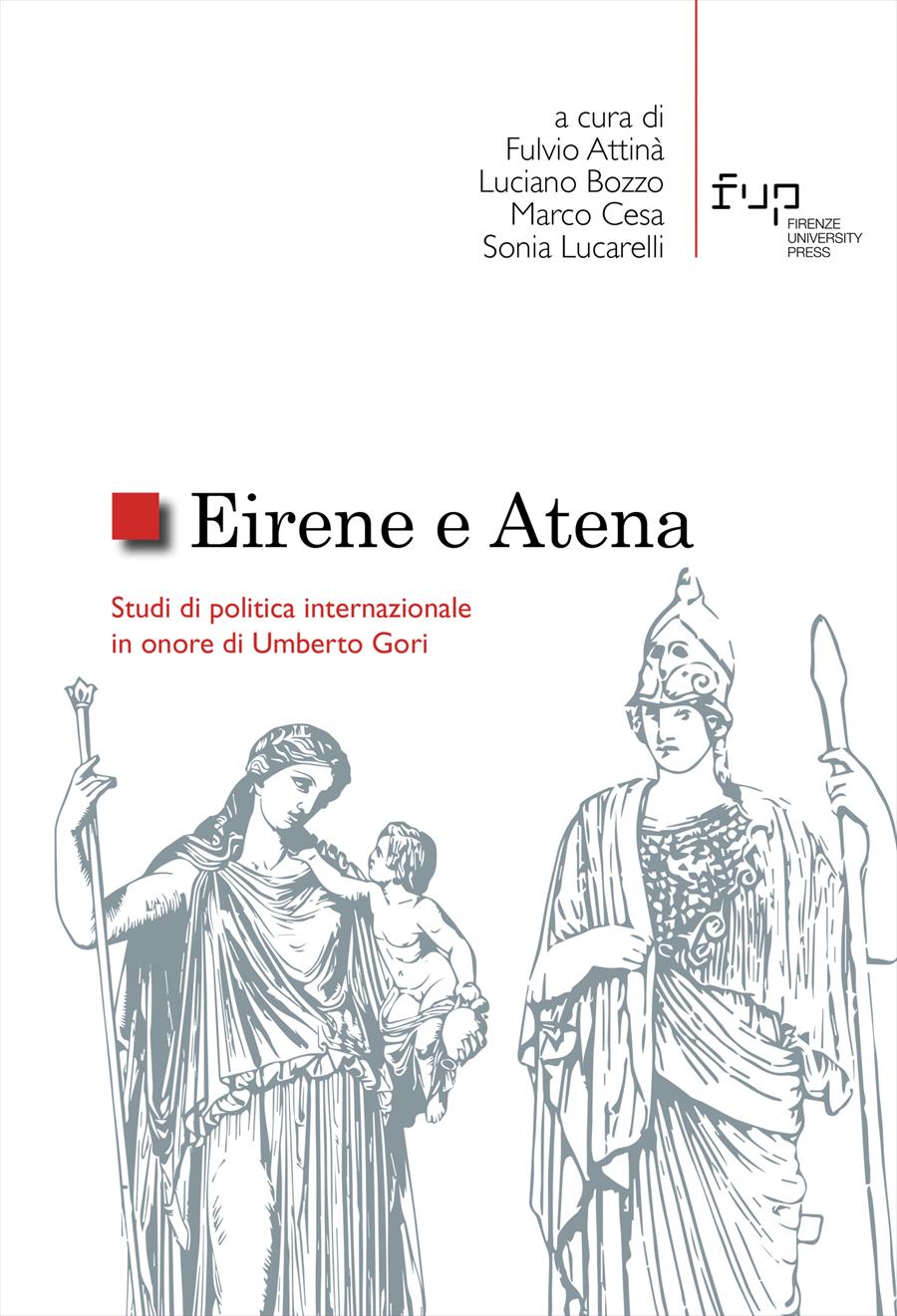- Eirene e Atena
- A cura di Fulvio Attinà, Luciano Bozzo, Marco Cesa, Sonia Lucarelli
Order is what states make of it. Interregnum, world-scale problems, and multilateralism
- Fulvio Attinà
- © 2022 Author(s) |
- CC BY 4.0
- DOI: 10.36253/978-88-5518-595-0.15
The present chapter assumes that using multilateralism to address world-scale problems has an impact on the future of world politics and may be the game-changer of the world political order. In the first section, attention is drawn to the establishment of the present world order, the multilateral institutions and policies that have been the cornerstone of such order, and the current order transition process. Based on the research knowledge about the ongoing world climate policymaking process, the second section explains the persistent role of multilateral policymaking as the way of responding to the problems that are widespread over the entire planet and are inherent to the structure of the world polity of the sovereign states.
- Keywords:
- world order,
- world-scale problems,
- multilateralism,
- interregnum,
- order transition,
University of Catania, Italy - ORCID: 0000-0001-7347-7078
- Abdenur, Adriana. 2021. “Climate action. Beyond the Paris Agreement.” In Global governance futures, edited by Thomas G. Weiss, and Rorden Wilkinson, 257–72. London: Routledge.
- Attinà, Fulvio. 2011. The global political system. Houndmills-Basingstoke: Palgrave Macmillan.
- Attinà, Fulvio. 2014. “Multilateralism and conflict management: assessing peace operations.” In Globalisation, Multilateralism, Europe. Towards a better global governance?, edited by Mario Telò, 373–87. Farnham: Ashgate.
- Attinà, Fulvio. 2021a. “World Climate Policy: Convergence and Transition.” ReShape Paper 17, <http://www.dsps.unict.it/sites/default/files/files/ReShape paper 17_online.pdf> (2022-07-15).
- Attinà, Fulvio. 2021b. “The World Order Lifecycle and World Power Competition.” In World Order Transition and the Atlantic Area. Theoretical Perspectives and Empirical Analysis, edited by Fulvio Attinà, 11–37. Cham: Springer.
- Babic, Milan. 2020. “Let’s talk about the interregnum: Gramsci and the crisis of the liberal world order.” International Affairs 96, 3: 767–86.
- Bauman, Zygmunt. 2012. “Times of interregnum.” Ethics & Global Politics 5, 1: 49–56.
- Brando, Nicolas. 2019. “Governing as commons or as global public goods: two tales of power.” International Journal of the Commons 13, 1: 553–77.
- Carr, Madeline, and Feja Lesniewska. 2020. “Internet of Things, cybersecurity and governing wicked problems: learning from climate change governance.” International Relations 34, 3: 391–412.
- Clark, Ian. 2009. “Bringing hegemony back in: the United States and international order.” International Affairs 85, 1: 23–36.
- Coleman, Katharina P. et alii 2021. “Slow Progress on UN Rapid Deployment: The Pitfalls of Policy Paradigms in International Organizations.” International Studies Review 23: 455–83.
- FCCC. 2021. Nationally determined contributions under the Paris Agreement. Synthesis report by the secretariat. New York: UNFCC.
- Gilpin, Robert. 1981. War and Change in World Politics. Cambridge: Cambridge University Press.
- Gramsci, Antonio. 2005. Selections from the Prison Notebooks. London: Lawrence and Wishart.
- Hodzi, Obert. 2018. “Delegitimization and ‘Re-socialization’: China and the Diffusion of Alternative Norms in Africa.” International Studies 55, 4: 1–18.
- Ikenberry, G. John. 2001. After Victory: Institutions, Strategic Restraint, and the Rebuilding of Order after Major Wars. Princeton: Princeton University Press.
- Ivanova, Maria, and Natalia Escobar-Pemberthy. 2021. “Biodiversity. Protecting the planetary web of life.” In Global governance futures, edited by Thomas G. Weiss and Rorden Wilkinson, 273–90. New York: Routledge.
- Kindleberger, Charles. 1981. “Dominance and leadership in the international economy.” International Studies Quarterly 25, 3: 242–54.
- Modelski, George. 1999. “From leadership to organization: the evolution of global politics.” In The future of global conflict, edited by Bornschier V., and C. Chase-Dunn, 11–39. London: Sage.
- Organski, A., and F. Kenneth. 1968. World politics. New York: Knopf. First published 1958.
- Rosenboim, Or. 2019. “State power and global order.” In International Relations 33, 2: 229–45.
- Ruggie, John.1993. “Multilateralism: the anatomy of an institution.” In Multilateralism matters. The theory and praxis of an institutional form, edited by Ruggie John, 3–47. New York: Columbia University Press.
- Stahl, Rune. 2019. “Ruling the Interregnum: Politics and ideology in nonhegemonic times.” Politics and Society: 1–39.
- Tammen, Ronald, and Jacek Kugler, and Douglas Lemke. 2018. “Foundations of Power Transition Theory.” In The Oxford Encyclopedia of Empirical International Relations Theory. Thompson, William, ed. Oxford: Oxford University Press.
- Thompson, William. 2020. Power Concentration in World Politics. The Political Economy of Systemic Leadership, Growth, and Conflict. Cham: Springer.
- Xuejun, Wang. 2018. “Developmental Peace: Understanding China’s Africa Policy in Peace and Security.” In China and Africa, edited by Chris Alden et alii, 67–82. Houndmills-Basingstoke: Palgrave Macmillan.
- Yan, Xuetong. 2018. “Chinese Values vs. Liberalism: What Ideology Will Shape the International Normative Order?” The Chinese Journal of International Politics: 1–22.
- Yi, Feng. 2021. “Friction, Competition, or Cooperation? Menu of Choice for the United States and China—A Power Transition Perspective.” In World Order Transition and the Atlantic Area. Theoretical Perspectives and Empirical Analysis, edited by Fulvio Atti
Informazioni sul capitolo
Titolo del capitolo
Order is what states make of it. Interregnum, world-scale problems, and multilateralism
Autori
Fulvio Attinà
Lingua
English
DOI
10.36253/978-88-5518-595-0.15
Opera sottoposta a peer review
Anno di pubblicazione
2022
Copyright
© 2022 Author(s)
Licenza d'uso
Licenza dei metadati
Informazioni bibliografiche
Titolo del libro
Eirene e Atena
Sottotitolo del libro
Studi di politica internazionale in onore di Umberto Gori
Curatori
Fulvio Attinà, Luciano Bozzo, Marco Cesa, Sonia Lucarelli
Opera sottoposta a peer review
Numero di pagine
208
Anno di pubblicazione
2022
Copyright
© 2022 Author(s)
Licenza d'uso
Licenza dei metadati
Editore
Firenze University Press
DOI
10.36253/978-88-5518-595-0
ISBN Print
978-88-5518-594-3
eISBN (pdf)
978-88-5518-595-0
Collana
Studi e saggi
ISSN della collana
2704-6478
e-ISSN della collana
2704-5919
